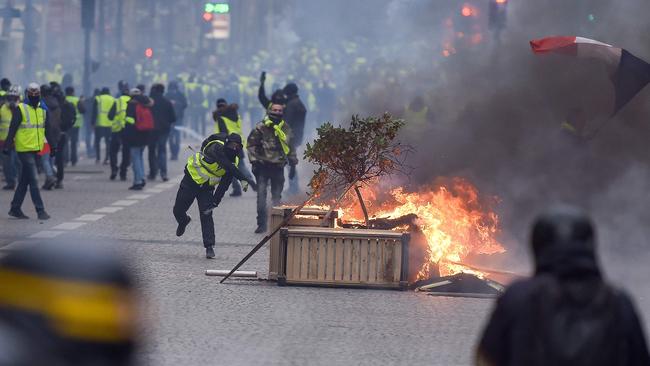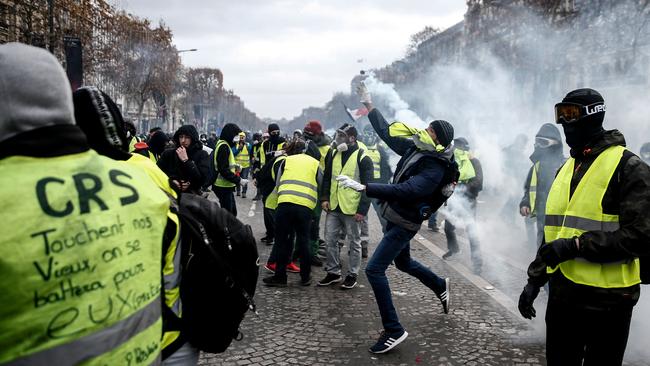The West is running out of money

The riots in Paris over the weekend and going back to November 17 have their roots in the fact that France is running out of money.
President Emmanuel Macron imposed a new fuel tax because France’s budget deficit is running perilously close to the maximum allowed in the EU of 3 per cent of GDP and national debt is 100 per cent of GDP versus the 60 per cent allowed.
The French government last ran a surplus in 1973. Government spending is 57 per cent of GDP, well over double Australia’s, and successive governments have proved incapable of even stabilising spending, let alone reducing it.
With cars burning on the Champs Elysee a week ago, Macron abandoned the fuel tax but that didn’t stop the so-called gilets jaune (yellow vests) movement taking to the streets again this weekend with even bigger, more ferocious protests, this time met with tear gas and rubber bullets.
What’s different about these protests, and the thing that should have every political leader in the western world taking note, is that these are not the leftists who usually do the rioting in Paris: these are ordinary people and workers, organised not by trade unions, or the Communist Party, but by Facebook.
France can’t tax its rich or its companies because they can easily move to Switzerland or Ireland, or an actual tax haven, so the most effective thing for Macron to do was impose a fuel tax, with the result that the nation’s disenfranchised, who live in poor villages and have to drive everywhere, boiled over.
These are the same sorts of people who voted for Donald Trump and for Brexit and like those in the US and UK, their grievances are wide-ranging and not easily dealt with.
That is especially true with their governments deep in debt and unable to do anything other than tax them some more, since companies and the financial elites are becoming untaxable and the demands on government spending are relentless. There simply isn’t enough money available to deal with their problems.
The same applies to the United States, the UK, Italy, Spain and Australia, leading to political turmoil and unhappy electorates in all of those countries.

In the US, President Trump cut company taxes and blew out the budget by $US113 billion in 2018 to 4.7 per cent of GDP (it would get kicked out of the EU), and there will be a reckoning, if not next year the year after.
Trump is, bizarrely, pushing the idea that tariffs will fix the budget and make America rich again. He tweeted recently: “Billions of Dollars are pouring into the coffers of the U.S.A. because of the Tariffs being charged to China, and there is a long way to go. If companies don’t want to pay Tariffs, build in the U.S.A. Otherwise, lets just make our Country richer than ever before!”
China doesn’t pay the tariffs, of course, they are a tax on Americans, but leaving that aside the amounts are tiny. Revenue from customs duty in 2018 was US$41 billion, an increase of less than US$7 billion. Every little bit helps, but tariffs won’t turn around the US budget deficit.
Italy’s new populist government is locked in an argument with the European Commission over its budget deficit, while Spain is battling to contain a budget blowout. And as for the UK – where to start?
As the big parliamentary vote on Prime Minister Theresa May’s Brexit deal looms, Britain’s budget deficit has risen to its highest level in three years.
In fact, it’s hard to find a western country that is not wallowing in deficits and public debt and with stable leadership. Even Germany, which produced yet another budget surplus this year, has a chancellor who is in office but not in power – on her way out. Trump, Macron, May and Merkel are all either under siege or leaving.
At least Germany is relatively stable for now; the other three are in various states of disarray and so, for that matter, is Scott Morrison in Australia – that is, under siege and probably leaving, although at least he hasn’t got a special prosecutor breathing down his neck, or riots in the street (apart from some children peacefully protesting about climate change), and he is not facing a devastating loss in parliament, probably. At least not for a month or two.
What is the common thread of these western countries who leadership is in such disarray? Big budget deficits and huge government debt.
They are not only unable to alleviate the problems that ordinary people have been facing from globalisation and technology, they are often having to make them worse with higher taxes.
* Alan Kohler is Editor in Chief of InvestSMART


